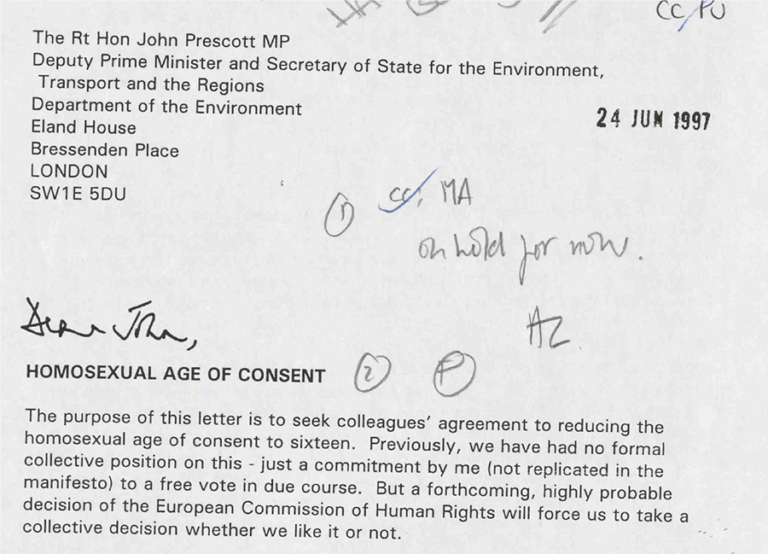To mark LGBT + History Month, this blog post draws on a recently released Prime Minister’s Office file which documents a significant advance in gay rights soon after the turn of the millennium.
The Sexual Offences Act of 1967 represented a partial decriminalisation of male homosexuality: it allowed two men to have sex in private in England and Wales provided they were over 21; much later, this provision was extended to Scotland and Northern Ireland. Over time, the age of consent for gay men became a live and contentious issue in UK politics.
In 1994 Conservative MP Edwina Currie introduced an amendment to lower the age of consent for homosexual acts, from 21 to 16 in line with that for heterosexual acts. Moving the amendment on 21 February 1994, Mrs Currie declared: ‘It is the first time in over a quarter of a century that the age of consent for homosexuals has been discussed by the House of Commons. The taboo of silence that has denied the sexuality of young gay men has been decisively broken.’ During this debate, Tony Blair, then Shadow Home Secretary, said: ‘a society that has learned, over time, racial and sexual equality can surely come to terms with equality of sexuality. That is the moral case for change tonight’. However, Edwina Currie’s amendment was defeated and the gay male age of consent was instead lowered to 18. The compromise did little to placate the thousands of angry gay rights demonstrators who had gathered outside Parliament. But, as Edwina Currie pointed out when looking back at this, ‘the atmosphere had been altered forever’.[ref]PinkNews, 1 June 2013.[/ref]

The next politician to take up the mantle and advocate for change on the age of consent for gay men was Jack Straw, who served in the Cabinet from 1997 to 2010 under the Labour governments of Tony Blair and Gordon Brown. In his memoirs Straw gave powerful testimony about the terrible cost caused by the burdens of shame and humiliation that were borne by young gay men. He developed ‘the most powerful conviction that criminalising people because of their sexuality is a stain on any civilised society’.[ref]’Last Man Standing: Memoirs of a Political Survivor’, Jack Straw (Pan Books, 2012).[/ref]
Prime Minister’s Office files recently transferred to The National Archives span the first three years of Tony Blair’s Labour Government, from 1997 to 2000 and among those files is PREM 49/882, described as HOME AFFAIRS. Homosexual rights in Great Britain and Europe: part 1, 1997 June 24 – 2000 Mar 29. Note the formality of the phrase ‘Homosexual rights’ which is used to describe the document (and appears on the file cover) rather than ‘Gay rights’, for example, but this is to be expected when referring to governmental documents of this period. You can download the file (which I have drawn upon for this blog post) here.
This is a ‘Home Affairs’ file, and the Home Secretary at this time (from 1997 to 2001) was Jack Straw. The file shows that he had only been in Office for less than two months when he started to press for reform on the homosexual age of consent.

In this letter to John Prescott, the Home Secretary’s stated aim is clear: ‘the purpose of this letter is to seek colleagues’ agreement to reducing the homosexual age of consent to sixteen’. The European Commission of Human Rights was about to publish a report on the merits of the case submitted by Euan Sutherland. At the age of 17, in 1994 Mr Sutherland had complained to the Commission that the higher age of consent for homosexuals (18) as opposed to that for heterosexuals (16) was a breach of his right to privacy under Article 8 of the European Convention for the Protection of Human Rights and his right not to be discriminated against in his private life under Article 14. Chris Morris, at the age of 16, had also lodged a similar complaint to the European Commission.
Straw stated that the Commission was likely to find UK law to be in breach of the Convention and that the European Court was likely to take the same line. But he didn’t want to wait until the Government was declared to be in breach of the European Convention on Human Rights (ECHR) and forced to take action; he felt that ’it would be very desirable to pre-empt such an outcome’.
The letter shows Jack Straw’s strong personal commitment to reform.

Straw was seeking support from his colleagues for his proposal to equalise the age of consent at 16 and for its inclusion in the forthcoming Crime and Disorder Bill. And he started to receive messages of support: Chris Smith (Culture Secretary) and Peter Mandelson (Minister without Portfolio) were among the first to back the proposal. However, looking at the file you can see that, at this stage, there were some sensitivities surrounding the issue of age of consent, probably from the presentational side of things – a note on Straw’s letter reads ‘Message from the Home Office – this letter has been withdrawn’.
However, this was just a temporary hold, and Jack Straw continued to press for proactive reform. The file shows the unwavering determination of the Home Secretary (and the Minister of State at the Home Office, Alun Michael) to make progress on this issue. But it proved to be a long and winding road before reform was achieved.
Straw sought a deal with Stonewall, the UK lesbian, gay, bisexual and transgender rights charity. The file shows that, by 15 July 1997, the Home Secretary had agreed a strategy with Prime Minister Tony Blair, under which the Sutherland Case is to be settled, and the Government would provide an opportunity for a free vote in a Criminal Justice Bill in the next Parliamentary session (1998/99). He explained to the PM that ‘cross-party agreement was seen as important by most members of the PLP (Parliamentary Labour Party) who were close to Stonewall. They believe that the all-Party aspect of this issue has moved further in their direction since 1994 with the election of William Hague[ref]As Conservative Party Leader in 1997.[/ref], who voted for lowering the age of consent to 16’.
Just under a year later, in June 1998 an amendment to the Crime and Disorder Bill moved by the Labour MP Ann Keen was passed, on a free vote, with a majority of 207. However, the House of Lords defeated the provision to change the age of consent to 16 on two occasions and Straw had to use the Parliament Act to override the Lords before the measure was passed by Parliament in November 2000. On 8 January 2001, the Sexual Offences (Amendment) Act finally came into force, reducing the age of consent for gay and bisexual men to 16 in England, Scotland and Wales, and 17 in Northern Ireland. A major legal obstacle for gay people had been overcome.
I’ve just given you a highly condensed summary of the long, and sometimes torturous process that resulted in reform, but from reading the digitised document PREM 49/882 you will become aware of the nuances accompanying the unfolding issue, including concerns about presentational aspects and reactions to the lobbying of Stonewall.
The file also includes a large amount of correspondence regarding issues surrounding birth certificates for ‘transsexuals’ (to quote the language of the time) and a European Court of Justice ruling regarding discrimination against transsexuals in employment.
It shows us that we shouldn’t be complacent with the rights that we currently have. They are the fruits of hard won past battles. We should remember and honour the many people that dedicated their lives to making theses changes happen. ?️??️??️?
Weirdly, my late Friend was jailed back in the 70’s because he was 26 and his lover was 25. I may have the figures wrong, but it does show how much , thanks to Ann Keen, that the English Government at least, has some common sense and are with the times. There are still some countries where you will be sentenced to Death just for expressing your sexuality…. So WE are extremely lucky how far forward we have progressed. And thanX to RuPaul for enlightening people to poly genders and beliefs and the odd bit of glitter…. Xb